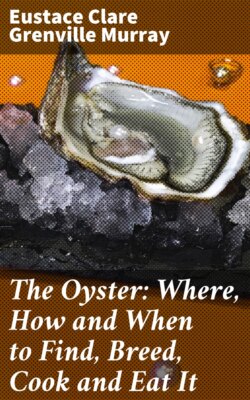The Oyster: Where, How and When to Find, Breed, Cook and Eat It

Реклама. ООО «ЛитРес», ИНН: 7719571260.
Оглавление
Eustace Clare Grenville Murray. The Oyster: Where, How and When to Find, Breed, Cook and Eat It
The Oyster: Where, How and When to Find, Breed, Cook and Eat It
Table of Contents
THE OYSTER
CHAPTER I. THE OYSTER IN SEASON
CHAPTER II. ANCIENT HISTORY OF THE OYSTER
CHAPTER III. MODERN HISTORY OF THE OYSTER
CHAPTER IV. THE OYSTER AT HOME
CHAPTER V. THE OYSTER IN ITS NEW SETTLEMENT
CHAPTER VI. THE OYSTER ON ITS TRAVELS
CHAPTER VII. THE OYSTER AT ITS JOURNEY'S END
CHAPTER VIII. THE OYSTER AND THE DOCTOR
CHAPTER IX. THE OYSTER ABROAD
CHAPTER X "THE TREASURE OF AN OYSTER."
FOOTNOTES:
Отрывок из книги
Eustace Clare Grenville Murray
Published by Good Press, 2019
.....
One person considers a loving wife, and four hundred a year, wealth and happiness; another would be miserable without four thousand, and could dispense with the wife. Some consider a post with five thousand a year a tolerable means of existence; others a commissionership with twelve hundred. Some seek a good consulship; others, till they have travelled from St. Petersburg and back in a telega, or sledge, half a dozen times during mid-winter, use the interest, which in other days would have secured a snug governorship, even in the Island of Barataria, to obtain a queen's messenger's place. At least so it used to be. Whether competitive examinations will lead to our having the right man in the right place, the round pegs in round holes, and the square pegs in square ones, still remains to be seen. And so is it with most things in life, whether personal or gastronomical. Different men are of different opinions; some like apples, and some like—onions; but I have scarcely ever yet met with the man who has refused a thoroughly good oyster.
There is not a man, however unobservant, but knows that oysters are a great source of profit to some of that multitude which rises every morning without knowing exactly how, when, and where it shall dine. Billingsgate in the oyster season is a sight and a caution. Boats coming in loaded; porters struggling with baskets and sacks; early loungers looking on—it is so pleasant to see other people work—buyers and cheapeners, the fish salesman in his rostrum, the wealthy purchaser who can lay out his hundreds and buy his thousands—all to be met with, together with that noise and bustle, and, far beyond it, all that incredible earnestness which always distinguishes an English market.
.....